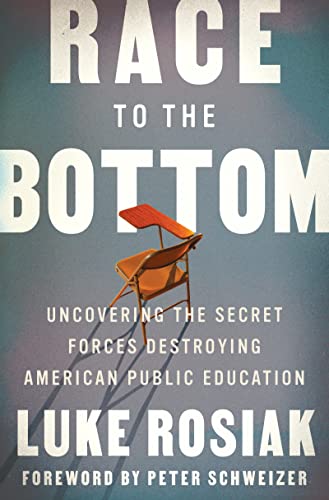Race to the bottom
Exposing the troubling agenda upending our public schools.
Parents across the country have trusted their most precious asset, their children, to K-12 public schools. Trusting that a pursuit of academic excellence is being prioritized. Trusting that students are being prepared to be informed and engaged citizens and members of society.
But a pandemic, school closures, and forced online learning revealed to many of these same parents that their child’s education is being compromised. Academic excellence has taken a backseat to a political ideology, and it didn’t happen overnight.

In his new book, Race to the Bottom: Uncovering the Secret Forces Destroying American Public Education, Luke Rosiak investigates our public school system and exposes the hidden agendas that have been pushed for decades by special interest groups and bad actors. He also identifies how American education got to the state it is in today, who enabled it, and why. Examples span the country, with several pages dedicated to Minnesota’s own education system and the extraordinary efforts to promote identity politics under the guise of equity.
It all starts with “schools putting their resources into everything except preparing our children for college or careers,” Rosiak writes. And it’s not a money issue. Billions of dollars have been spent on initiatives promising to solve racial inequalities and improve academic performance but that instead work against the very idea of expectations and excellence.
That hasn’t kept school leaders from doubling down and continuing to hire for-profit racial equity consultants and partner with philanthropic foundations more concerned with tagging any “system” that highlights racially unequal results as inherently “systemically racist” versus proposing and pursuing ways to help all students excel.
As Rosiak unravels the spider’s web, he finds that those bent on turning our education system into something it was never intended to be wear multiple hats for multiple front groups. Thus, successfully hiding their influence.
Foundations
Far from “merely the rich families who paid for some art museums or public television programming,” philanthropic foundations have spent billions of dollars — accumulated through capitalism — to create various associations and activist groups. “The foundation money serves as seed money that is eventually leveraged by another source,” Rosiak writes. “The foundations have created their own mouthpieces and gotten others to pay for it. There are hundreds of such activist groups, local and national, pushing complaints about ‘systemic racism,’ equity, and the evils of capitalism to public schools and children.”
Take the MacArthur Foundation. Rosiak explains how the controversial 1619 Project likely saw the light of day thanks to the foundation. In 2014, MacArthur awarded a $1 million, three-year grant to ProPublica — a liberal nonprofit news outlet for which Nikole Hannah-Jones wrote about race issues. She joined the New York Times the following year, producing her 1619 Project series that was turned into grade school curriculum. The Pulitzer Center, the nonprofit that has pushed curricula based on the 1619 Project series into school districts across the country, is also funded by the MacArthur Foundation, Rosiak reveals. Additionally, “MacArthur secured a position for Hannah-Jones as a professor at Howard University, where she would teach her racial ideas and continue the 1619 Project, by donating $5 million to the school.”
School boards
National political interest groups have also used local education and school boards as prime real estate to “quietly amas[s] extraordinary control, all over the country.” In Fairfax County, Va., out-of-state dollars influenced local campaigns, and new school board members were driven to pursue a variety of agendas, few of which had to do with education.
‘Equity’ consultants
Consultant Glenn Singleton through his Pacific Educational Group (PEG) has made “millions of dollars implanting radical ideas into K-12 schools.” Rosiak traces Singleton’s influence, including how he laid the groundwork for the rhetoric that now dominates
a large portion of American school districts. His teacher trainings have focused on “white privilege” and even included separating attendees into racially segregated groups where white people had to confess in what ways they were white and develop a plan
to challenge their whiteness, Rosiak writes. PEG has been active in several Minnesota school districts over the years, including the Edina school district, where a push for “educational equity” led to proficiency declines.
All this focus on money and equity, Rosiak writes, has resulted in crumbling academic standards, the effects of which will hurt American kids in ways that will impact them for decades.
If there is a silver lining to COVID-19, it is that it has resulted in a “long-overdue wake-up call” regarding the state of America’s public education system, Rosiak concludes. “For the sake of our kids’ happiness, for the sake of our constitutional republic, for the sake of a modern world fueled by scientific and technological advancement, we can never, ever go back to sleep.”
A version of this article was originally published in the Washington Examiner.